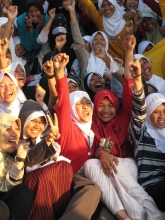Indonesian Islamic boarding schools are traditionally located in rural settings—set apart from cities and towns, and often situated great distances from students’ friend and families. Gated facilities and limited time off school grounds are typically seen as disciplinary tools meant to protect students from the “dangers of modern life.” This paper is a case study of two Islamic boarding schools in the city of Yogyakarta, Indonesia. The first, Madrasah Mu’allimaat Muhammadiyah, is a cadre school for girls overseen directly by the modernist Muslim social welfare organization, the Muhammadiyah. The second school, Pesantren Krapyak Ali Maksum, is a nationally renowned Islamic institution loosely affiliated with the traditionalist Nahdlatul Ulama. This paper analyzes the process of ethical subject formation—how an individual learns and engages with an ethical tradition or traditions—among high school girls at these two institutions. I evaluate how the pedagogical ideology of these two schools differ in their view of the urban landscape of Yogyakarta—with its malls, museums, Internet cafes, non-Muslims, and the like—as an ethical challenge and as a tool for moral instruction to their students. I analyze the unexpected emphasis placed on the role of “freedom” (kebabasan) within student training on school grounds and how young women use “fun” and leisure as ways to explore the boundaries of the guidelines given to them by the school. I argue that anthropologists of morality and of Islam should take seriously moments of fun as instances for “reflective freedom” (Laidlaw 2014)—the active deliberation over the bounds of moral behaviors—and that these moments be taken not as ruptures but instead as an everyday occurrence in the life of a piety-minded individual. I take up the issue of television viewing, dress, and dating to illustrate both the flexibility and fixity of moral values in girls’ lives.
Dr. Claire-Marie Hefner is a visiting assistant professor in cultural anthropology at Manhattanville College in New York where she teaches courses on Southeast Asia, Islam, gender, education, and ethnographic writing. Dr. Hefner has over fifteen years of experience traveling to and living in Indonesia where she trained extensively in traditional Balinese dance and Javanese gamelan. Dr. Hefner is currently working on a book manuscript entitled, “Achieving Islam: Women, Piety, and Moral Education in Indonesian Muslim Boarding Schools.” Based on twenty-one months of ethnographic field research, this manuscript is a comparative study of women’s achievement and moral formation in two Islamic boarding schools for girls in Yogyakarta, Indonesia.

